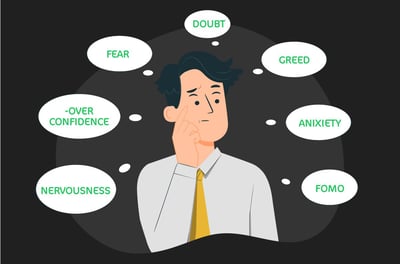Table Of Contents
How to Navigate the Pitfalls of Beginner Trading Psychology
As a longtime trader, I can attest that retail trading in all its forms can be both rewarding and captivating. Yes, there is a significant chance that traders can lose money, but there is always the chance of making profits. Recent estimates contend that there are approximately 10 million active retail FOREX traders worldwide.
That number is just FOREX, you can imagine how many more millions there are trading other financial instruments, like stocks, commodities, bonds, contracts for difference (CFD), and cryptocurrencies.
The thing is, every trader starts somewhere. I'm here to tell you that making your first trade can be scary as well as thrilling. It’s important to develop a good trading psychology as early as possible to set you on the right path. In this article, I will explain what trading psychology is and why it is so important for all traders, especially beginners.
Trading psychology is the emotional foundation that shapes how you make decisions in the market
Fear, greed, and overconfidence can wreck trades if you don’t learn to recognize and manage them early
New traders must stay self-aware and avoid letting wins or losses dictate their next move
Journaling, goal-setting, and regular self-reflection can help you stay disciplined and emotionally balanced
Avoid herd mentality by doing your own analysis instead of following hype or panic
Biases like overconfidence and confirmation bias can distort your judgment and lead to bad trades
Loss aversion often causes traders to hold onto losing trades longer than they should
Developing strong emotional control is just as important as learning chart patterns or trading strategies
A Day in The Life of a Trader
I understand that many individuals are drawn to trading as a hobby, intrigued by the markets and the potential for a payday. If this is a newbie like you, it’s not really possible to depend on trading as your primary income source, but that doesn’t stop you from thinking it could be one day. Many successful individual traders do this for a living. Like them, you must invest time and resources to understand market trends and make informed decisions.
On the other end of the seriousness spectrum, professional traders operate in various financial markets, leveraging vast amounts of data, sophisticated tools, and precise strategies to generate profits. These high-flyers often work for financial institutions or hedge funds.
Trading psychology applies to both ends of the spectrum. At the heart of trading psychology is the understanding that human emotions, such as fear and greed, can profoundly influence decision-making.
Recognizing and managing these emotions is crucial, as unchecked emotional responses can lead to impulsive decisions that can wreck the career of a promising trader. As an effective trader, you must not only have a grasp of market analytics but also a deep understanding of your own psychological responses to the market's ebbs and flows.

What is Trading Psychology?
Trading psychology is the area of interest that delves into the emotional aspects that underpin a trader's decision-making processes. It’s about how a range of emotions, from fear and greed, which I've mentioned, interact with elation, regret, or disappointment to drive investment behaviors.
I've seen so many times how emotions often take individuals away from their planned strategies. The psychological makeup of a trader plays an important role in determining their success or failure in the market. All too often, there are instances of newbie traders succumbing to emotional responses that derail a well-laid trading strategy.
For example, a trader elated by consecutive wins might easily become overconfident, taking on more risk than usual. This could lead to significant losses in a downturn. On the other hand, if a trader is rattled by a string of losses, they could become overly cautious, missing out on profitable opportunities. By understanding and managing trading psychology, you can cultivate behaviors that enhance decision-making, ultimately improving your chances of making money and having a successful career.
Why Trading Psychology Is Crucial for New Traders
Retail trading is often compared to a roller-coaster, not just for its financial ups and downs but also for its emotional highs and lows. Imagine you experience the thrill of a soaring stock, the disappointment of a bearish market, the satisfaction of a winning decision, and the regret of a missed opportunity—all in one day!
This emotional whirlwind is heightened by the fast-paced nature of certain markets and the never-ending onslaught of news and data, making the world of trading both exhilarating and exhausting. Trading financial instruments like stocks, commodities, bonds, contracts for difference (CFD) and cryptocurrencies is take a lot of attention.
If you look at it that way, trading psychology could be seen as the guiding hand that helps keep you stable through rough markets. It’s so easy to be deflated by recent losses and become risk-averse. Imagine all the opportunities to trade you could leave on the table.
On the other hand, the thrill of a winning streak could lead you to overstretch yourself. Recognizing and managing these psychological nuances is vital for consistent success in the market. That's why you should always supplement your trading approach with sound risk management guardrails informed by tools like technical analysis.
The Ideal Psychological Space for a New Trader
In my opinion, here are some important traits a trader should possess to make the most of their trades:
Self-awareness:
Traders must learn about the personal biases that might tint their decision-making processes. Recognizing your own strengths offers a solid foundation on which to build, while understanding weaknesses offers areas for growth and caution. This self-knowledge allows you to approach the markets with clarity.
Emotional regulation:
The financial markets can be a headrush. Regulating your emotions, especially such dominant ones as fear, greed, hope, and regret, is crucial. Your ability to remain poised while the market is volatile often determines how successful you can be.
Discipline and patience:
In trading, speed does not always reap rewards. Having rock-solid discipline is the best way to guide your trading strategies and reduce risk. If you match discipline with patience, you can often resist the urge to jump at every new opportunity, instead of waiting for the right moment that aligns with your trading plan.
Adaptability:
The only constant, in life as in trading, is change. As markets ebb and flow, you must have the adaptability to pivot your strategies and approaches. You must be open to learning and taking on new information. This way, you can remain relevant and effective, regardless of market shifts.
Recommended Brokers
Key Psychological Tips for New Traders before Their First Trade
From what I've learned as a longtime trader, here are some top tips about what to do before you start your trading journey:
Start with a clear mind:
Some people practice meditation, others use different relaxation techniques. Either way, it’s always best to have a clear mind before you approach the hustle and bustle of trading.
Set clear goals:
I cannot state this often enough. You must understand what you want from trading – be it a certain profit, a learning experience, or achieving a financial goal. It's all part of a solid trading plan.
Risk management:
Every trader should know to only invest what they can afford to lose, and always use stop-loss orders to protect their money.
Avoid herd mentality:
Just because everyone is doing it doesn’t mean it’s the right decision. Yes, there is more evidence of the popularity of copy trading, but that is not the same as simply mimicking what seems like a good thing to do. Copy traders imitate successful traders, they don’t follow fads.
Stay informed:
Information is your friend. Make sure you are customizing your newsfeed to consume relevant news rather than getting swamped with too much information.
Journaling:
I've witnessed many traders succeed by documenting their thoughts, emotions, and reasons for their trades. This is said to help in self-reflection and future strategy development.
Continuous learning:
Recognize that losses are part of the journey, and they provide learning opportunities. You must always be open to taking lessons from the market as you improve as a trader.
Common Psychological Pitfalls and How to Avoid Them
Biases are shortcuts we take to make quicker decisions. Sometimes they get us into trouble. Here are some of the most common biases and pitfalls:
Overconfidence bias:
Overconfidence bias can be a dangerous pitfall in the trading world, leading individuals to believe they have superior knowledge compared to others. If you let your success go to your head, it can cause you to make hasty, ill-informed decisions. To avoid falling into this trap, you should consistently self-reflect and challenge your beliefs. As I've said, it’s also useful to keep a trading journal, documenting decisions and outcomes, which can highlight the times you were overconfident.
Confirmation bias:
Confirmation bias skews your perspective, causing you to seek out information that aligns with your pre-existing beliefs and dismiss useful evidence. This can lead to a narrow view of market conditions. To get around this cognitive pitfall, you should actively diversify your information sources, making sure you get your information from several different outlets. Practice critical thinking and regularly challenge your own beliefs.
Loss aversion:
The emotional pain of a financial loss can sometimes overshadow rational decision-making, causing traders to cling to losing positions in the hope of a turnaround. This phenomenon, known as loss aversion, can lead you to financial ruin. To navigate this, be sure to set clear stop-loss parameters in advance, making sure to exit positions before losses reach unsustainable levels. Remember to frequently return to your trading strategy to remind yourself about the parameters you have set.
The Bottom Line
In my experience, in the fast-paced world of trading, psychology is an important pillar. It often wields as much influence over outcomes as market data itself. As I've shown, emotions and biases can either strengthen or unravel even the most astute financial strategies.
As new traders embark on their journeys, it's imperative to prioritize psychological readiness alongside, or even above, financial acumen. By mastering the inner landscape of your mind, you not only safeguard your investments but also increase your chances of sustained success in the ever-fluctuating world of finance.
FAQ
Trading psychology refers to the emotions and mental state that traders experience when making buying or selling decisions in the markets. It encompasses understanding and managing one's emotions, biases and cognitive processes to make more effective and rational trading decisions.
Emotions can heavily influence decision-making. Without proper psychological discipline, traders might make impulsive decisions based on fear or greed, which can result in significant losses. Proper understanding and management of your own psychology can lead to more rational decisions and, potentially, better trading outcomes.
First, it's crucial to recognize and accept that these emotions exist. Developing a strict trading plan, setting clear entry and exit points and using risk management tools like stop-loss orders can help limit emotional decisions. Also, regular self-reflection and maintaining a trading journal can help traders understand and manage their emotions over time.
Absolutely! The world of trading can be complex and volatile. New traders often face a steep learning curve. It's essential to pace yourself, start with a small investment, seek education and consult an expert source to guide the early stages of your trading journey.
Education is key. The more you understand about common biases and emotional responses, the better equipped you'll be to recognize and combat them. It's also useful to have a clear and tested trading strategy, regularly review and learn from both successes and failures and seek feedback from trusted sources.
Journaling provides a structured way to record your trades, strategies, and emotions at the time of each trade. By reviewing your journal, you can gain insights into patterns or repetitive mistakes rooted in your psychology. Over time, this reflection can give you invaluable information to understand your own biases and emotional triggers.






